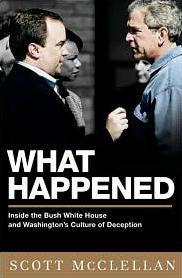 |
|
 |
|
 |
 |
 |
 |
 |
 |
 |
 |
 |
 |
| 2016 Election: | Hillary's book | Trump's book | Bernie's book | Ted Cruz's book | | | 2016 Senate Debates |
What Happened Inside the Bush White House and Washington's Culture of Deception, by Scott McClellan  (Click for Amazon book review)
Looking for the Hillary book of the same name?
| ||||||||||||||||||||||||||||||||||||||||||||||||||
"This is a book about the slice of history I witnessed during my years in the White House and about the well-intentioned but flawed human beings--myself included--who shaped that history. I've written it not to settle scores but simply to record what I know and what I learned in hopes that my account will deepen our understanding of contemporary history." |
|
McClellan proposes a solution in his final chapter entitled, "Changing the Culture of Deception":
We excerpt below most of the key points that McClellan makes about the key players in the Bush White House. Our conclusion is that the IDEA of this book (that a Bush confidante admits that the war was "sold") is mush less damning of Bush than the book's actuality.
The president must demonstrate an unyielding commitment to three important principles:
- a high level of openness, forthrightness, and honesty when communicating with the American people;
- a spirit of inclusiveness and unity, which reaches across partisan divides and ideological differences to encourage cooperation among all groups and individuals; and
- a readiness to consistently govern toward the center, seeking common ground from which to solve problems rather htan appealing to a narrow base of opinion.
-- Jesse Gordon, jesse@OnTheIssues.org, July 2008
| OnTheIssues.org excerpts: (click on issues for details) |
|
Abortion George W. Bush: 1990s: Sought to find common ground on divisive issues. George W. Bush: First day as president: reinstate Mexico City Policy. |
|
Crime George W. Bush: Death penalty saves innocent lives through deterrence. |
|
Drugs George W. Bush: Former bad habits are message to learn from experience. George W. Bush: Considered hypocritical for hard line on cocaine after using. George W. Bush: Nov. 2000: DUI revelation probably cost Bush popular vote. |
|
Energy & Oil Dick Cheney: Criticized for task force secrecy, but focused on leak-limit. |
|
Environment George W. Bush: Katrina flyover image interpreted as detached & powerless. George W. Bush: Katrina response overshadowed by FEMA botch-job perception. |
|
Foreign Policy Condoleezza Rice: Bush's views on foreign policy were one & the same as Rice's. |
|
Homeland Security George W. Bush: First reaction to 9/11: get military ready on many fronts. George W. Bush: Believed military was needed for Katrina response. Hillary Clinton: Led criticism about what Bush knew prior to 9/11. Tommy Thompson: Pushed smallpox vaccinations in response to anthrax attacks. |
|
Principles & Values Bill Clinton: OpEd: To History, many Clinton scandals may be insignificant. Dick Cheney: OpEd: Possibly knew about PlameGate, but encouraged lie. George W. Bush: OpEd: White House had deliberately outed CIA agent Plame. George W. Bush: The "sixteen words" became near-fatal blow to credibility. George W. Bush: Rice & Cheney were most important advisors beginning in 1999. George W. Bush: Held "strategery" meetings (admitted mangling English). George W. Bush: 9/20/01: You're either with us or with the terrorists. Newt Gingrich: OpEd: Contract agenda smart; but exaggerated scandal culture. Richard Nixon: First President to keep permanent political operation. |
|
Social Security George W. Bush: Option to invest 2% to 4% of funds in "safe" stocks. |
|
War & Peace Colin Powell: Omitted shaky Niger uranium claim from 2003 UN speech. Colin Powell: Only major adviser to Bush to question Iraq war. Dick Cheney: OpEd: Saw 9/11 as an opportunity to take out Saddam. Dick Cheney: On 9/11, said no Saddam-al-Qaeda link; but yes by Dec. 2001. Dick Cheney: 2002: Saddam is a madman pursuing nuclear weapons. Dick Cheney: 2003: Accused of falsifying Niger uranium to justify Iraq. Dick Cheney: PlameGate: discredit Niger report by revealing CIA operative. Dick Cheney: OpEd: VP's office knowingly misled public about PlameGate. George W. Bush: Iraq was top issue at start of presidency, even before 9/11. George W. Bush: Feb. 2001: Bombed Iraq; routine enforcement of no-fly zone. George W. Bush: Campaign to sell the Iraq War began with 2002 UN speech. George W. Bush: Adviser resigned after revealing Iraq might cost $200B. George W. Bush: OpEd: Bush had decided by Nov. 2001 to invade Iraq. George W. Bush: 2003: No difference if Saddam had WMD or trying to get WMD. George W. Bush: No difference between war of necessity and war of choice. George W. Bush: No difference between war of necessity and war of choice. George W. Bush: 2004: Unwilling to admit mistakes in invading Iraq. George W. Bush: Pardoned Scooter Libby for PlameGate & leak of CIA identity. George W. Bush: OpEd: Selling war instead of open debate damaged presidency. |
|
|
All material copyright 1999-2022 by Jesse Gordon and OnTheIssues.org Reprinting by permission only. |
E-mail: submit@OnTheIssues.org Send donations or submit quotations to: OnTheIssues.org 1770 Massachusetts Ave. #630 Cambridge, MA 02140 |
OnTheIssues.org
| |
| Most recent quotations | Archive of books & debates | Candidate Matching Quiz | |
Page last edited: Feb 26, 2019